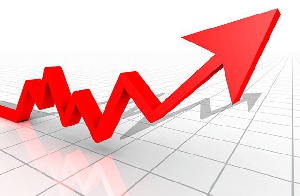For a fourth consecutive month, consumer inflation has slowed, reaching a single digit in November, although still above the pre-COVID-19 level.
November inflation was 9.8 percent, which is 0.3 percentage points (ppts) lower than the October rate of 10.1 percent.
Inflation, which stood at 7.8 percent in March, rose to a peak of 11.4 percent in July because of COVID-related disruptions to supply and panic demand for food items.
Data released by the Ghana Statistical Service (GSS) attributed the fall in inflation to a 0.9-percentage-point fall in food inflation to 11.7 percent. The food group contributed 53 percent to the total inflation and remains the predominant driver of year-on-year inflation. Non-food inflation remained unchanged at 8.3 percent.
According to Databank Research, the sustained drop in inflation is favourable for the continued dovish stance of monetary policy to support the post-COVID economic recovery.
“With a projected double-digit budget deficit and debt ratio above 70 percent in 2020, we perceive limited scope for additional fiscal stimulus in 2021 to strengthen the economic recovery. In view of the fiscal constraint, we believe the drop in inflation strengthens the case for extended support from Bank of Ghana, using all available options in the monetary policy tool kit,” it said.
The bank further stated that the quick reversal in inflation to the central bank’s target range of 6 to 10 percent underscores the view that inflation expectations are well anchored.
“This is underpinned by the steady improvement in monetary policy credibility, restored under the 2015–2019 IMF programme and largely maintained post-reforms.”
The investment bank however cautioned that the lagged effect of the sharp growth in money supply during the fourth quarter could pose an upside risk to inflation from December to the first quarter of 2021.
“We believe the firmly anchored inflation expectations, coupled with the excess capacity in the economy’s supply side, could cap the upside risks. We thus project headline inflation to close 2020 at 9.8 percent in December,” it said.
Business News of Saturday, 12 December 2020
Source: thebusiness24online.net
Inflation heads back to single digit in November - Ghana Statistical Service
Entertainment












